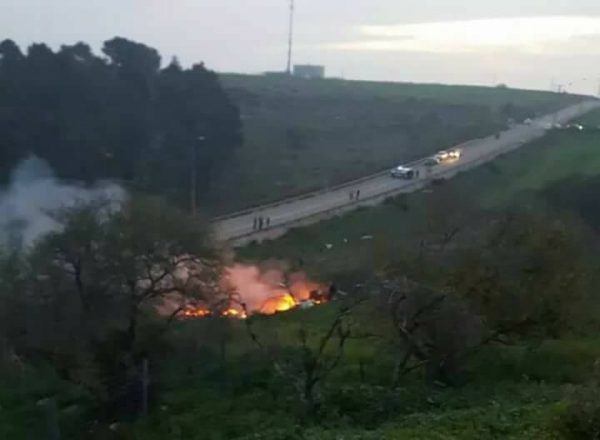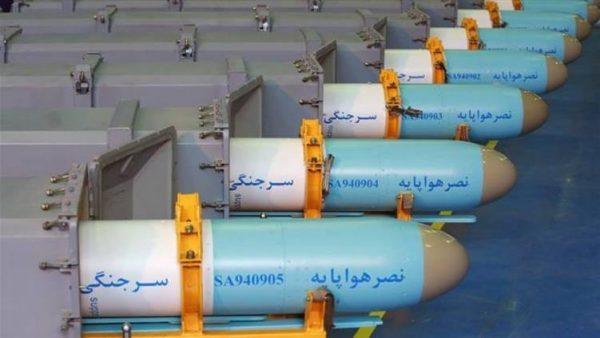On the 11th of February, the Syrian Observatory for Human Rights reported that six Syrian regime personnel and allies were killed the previous day in an Israeli Air Force (IAF) strike in Syria.
The Observatory’s report, announced via Twitter, stated that the casualties included those “of Syrian and non-Syrian nationalities” but did not elaborate.
The Israel Defense Forces (IDF) Spokesperson’s office confirmed that the military launched a large-scale attack against Syrian aerial defense systems and Iranian targets in Syria. “Twelve targets, including three aerial defense batteries” consisting of Syrian SA-5 and SA-17 surface-to-air missile batteries and “four Iranian targets that are part of Iran’s military establishment in Syria were attacked.”
The strike was in response to an infiltration into Israel by an Iranian drone earlier that day. The drone originated from an airfield near Palmyra, Syria, and was successfully intercepted and destroyed by an IDF Apache helicopter.
During the Saturday IAF attacks, one Israeli F-16 was shot down after being hit by a Syrian surface-to-air missile. According to reports, Syrians fired ten missiles at one of the fighter planes participating in the operation, and one was able to lock on to its target. The two pilots ejected from the craft before its was hit. Both landed in Israeli territory but were injured upon impact. The incident marks the first time an Israeli fighter jet has been shot down in over 30 years, the last occurrence having taken place in 1982 during the first Lebanon War.

Despite the loss of the F-16, the operation was certainly an overall win for Israel. The IAF conducted another round of strikes on the same area immediately following the shoot-down, and overall managed to destroy half of all Syrian air defenses according to reports.
The unfortunate implications of recent events are undeniable. The recent clash of the IAF and Assad’s forces over the skies of Syria is the coming-to-a-head of the long-expanding joint military infrastructure of Iran and Syria along Israel’s northern border. While this build-up has been in the works for years, changes in the tide in the Syrian civil war have allowed Syria and Iran to put more focus on developing bases closer to Israeli territory.
The defeat of ISIS in Raqqa and other strongholds, as well as the clearing of rebel forces in the country’s south, have freed-up logistics, manpower, and overall strategic “bandwidth” with which to focus on these projects. The Homs Governorate airbase, from where the recently intercepted Iranian drone was launched, is one example of the fruits of this co-op. For the past several months, the base has been operating as a forward outpost of the Quds Force of the Iranian Revolutionary Guards.

All of this is only increasing the chances for all-out conflict in the region, and what might culminate in a Third Lebanon War. Indeed, Israeli officials have been increasingly alluding to more intervention in Syria. Recently, the head of IDF’s Northern Command, General Yoel Strick, stated publicly that Israel would act decisively to destroy Iran’s network of “forward command” posts in southern Syria. At a recent promotion ceremony for an officer under his command, Strick told those present, “We are not inclined toward escalation, but we have high-level capabilities and we will not hesitate to use them.”
There are a few things to consider in light of this steadily intensifying situation.
One is how an escalation of operations would impact Israel’s partnerships in the region, specifically with the U.S. and Russia.
Dealing with the American interests will be less complicated. The administration has already shown its support of Israel regarding the incident. The White House released a statement shortly after last week’s IAF strike placing the blame for the violence squarely on Iran and Syria, while supporting Israel’s right to defend itself from “militia forces in southern Syria.”

Dealing with Russia, however, could potentially be a more difficult feat for Israel moving forward.
The Russian Federation is quite invested in the area to Israel’s north. Several economic and diplomatic considerations brought Russia to lend its support to the Assad regime in the ongoing Civil War. Russian military intervention in Syria began in 2015, and the nation still maintains substantial military deployments in the country.
Within the context of Israel and Russia’s growing relationship over the past decade, which has included the signing of a joint “security partnership,” hi-tech weapons sales, and the opening of a secure channel of communication for information sharing on military operations, the two countries have had to carefully coordinate at important junctions during the conflict to Israel’s north.
Russia on its part has long given Israel advance warning of its operations in Syria. In fact, when Russia first started to intervene in the civil war in September of 2015, Netanyahu and his Chief of Staff Lieutenant General Gadi Eisenkott flew to Moscow to meet with Putin and other Kremlin officials to map out a plan of keeping their respective governments alert of each other’s military activities in Syria. Since then, the two nations have stayed on point in keeping the other informed and allowing their respective forces to operate unabated.
The other consideration is which players would participate in an Israeli northern-front war and what this war might look like.
The Kremlin has put up red lines against Israeli interests in the region, at least on the diplomatic end. Last September, for instance, Russia threatened to use its veto power to block a United Nations resolution to renew the mandate of peacekeeping forces in southern Lebanon if the text of the document targeted the Shiite militant group Hezbollah, Russia’s ally in the civil war.
In this instance, however, its seems very likely that Russia will not hinder Israeli efforts to defend itself. The reason for this lies in the simple fact that Israel’s operations at root are not aimed at Russian interests in the country. While the regime’s assets may in fact be hit during these operations — as they were in last week’s airstrike — Israel’s goal is not to bring down Assad, but rather to prevent Iran from capitalizing on their position in Syria to harass the Jewish State. Russia can live with this, and probably does not want to risk conflict with Israel over the issue.
The other consideration is which players would participate in an Israeli northern-front war and what this war might look like.
The fight would not only involve Assad’s regime forces but his natural regional allies. This would without a doubt include Hezbollah. Back in June, the leader of the terror group, Sayyed Hassan Nasrallah, stated that a future war waged by Israel against Syria or Lebanon could draw “thousands” of Shiite fighters from around the region. “The Israeli enemy must know that if an Israeli war is launched against Syria or Lebanon, it is not known that the fighting will remain Lebanese-Israeli, or Syrian-Israeli,” Nasrallah said in a televised speech.
Iran would certainly be an enemy Israel would be forced to deal with. The confrontation with Iran would likely not be in the form of Iranian troops but rather the infrastructure and hardware Iran has established in the country. In addition to aerial drones and their bases, Iran has constructed weapons manufacturing sites throughout Syria and Lebanon.

Known manufacturing sites that Israel would have to destroy include a factory in the eastern Bekaa Valley in northern Lebanon that produces the fairly accurate Fateh-110 missile with a range of close to 300 km, capped with a half-ton warhead. Another site is a facility located between Sidon and Tyre in southern Lebanon, capable of producing surface-to-air and anti-tank missiles as well as unmanned aerial vehicles able to carry explosives. Eliminating these facilities as well as identifying and destroying stockpiles of their deadly products on the ground, would be the main objective of any Israeli operation in Syria and Lebanon.
Currently, the future on Israel’s northern front does not look promising. On Tuesday, Syria’s Assistant Foreign Minister, Ayman Sussan, threatened that “more surprises” await the Israelis. In response, top Israeli officials have expressed only resolve to continue pushing forward with their operations in the country.
















